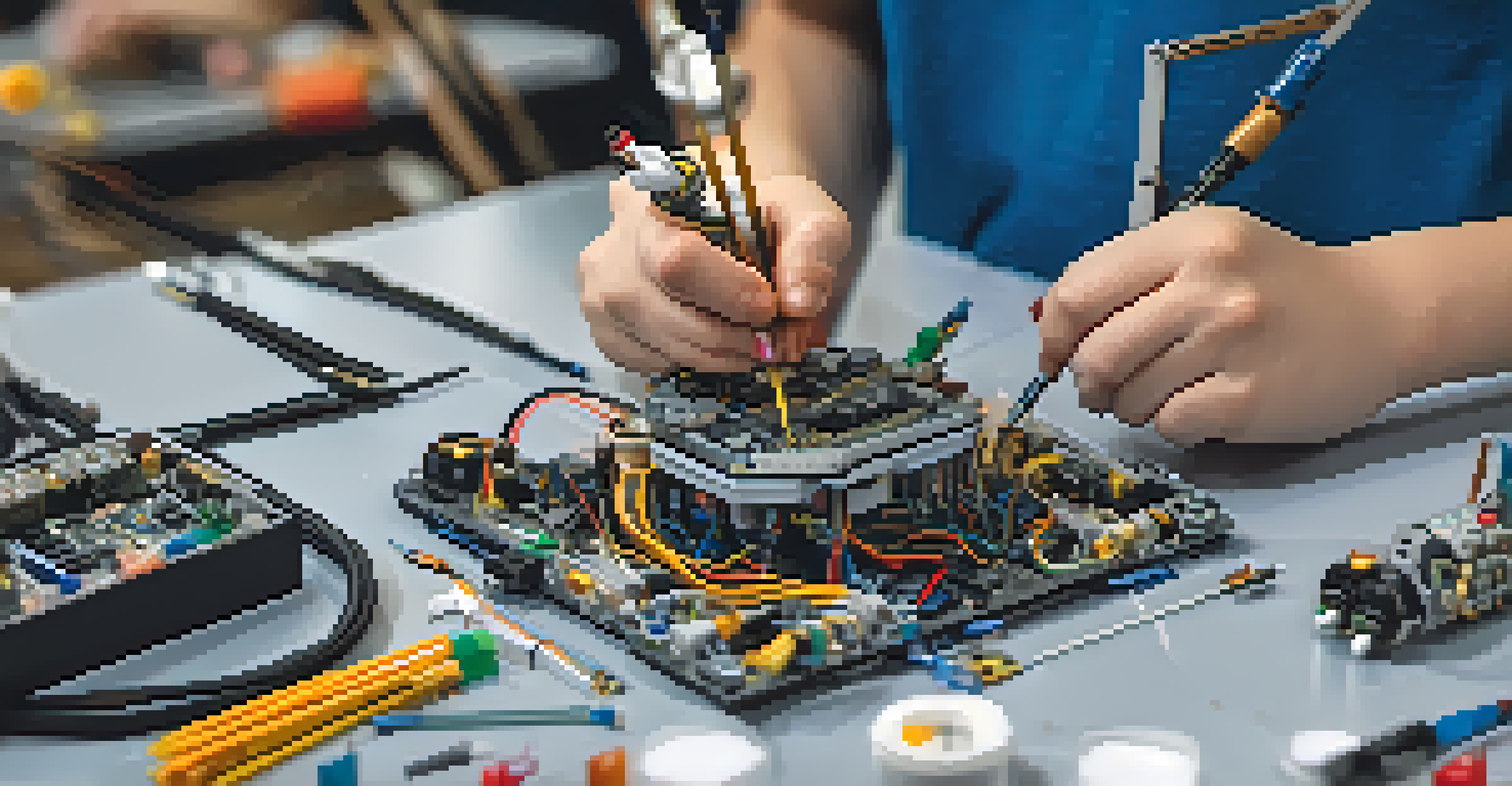The Importance of STEM Education in Tennessee Schools

Understanding STEM Education and Its Components
STEM stands for Science, Technology, Engineering, and Mathematics. It represents a curriculum designed to foster critical thinking and problem-solving skills. In Tennessee schools, STEM education is becoming increasingly vital as it prepares students for future careers in a tech-driven world.
Science is not only a disciple of reason but, also, one of romance and passion.
When students engage with STEM subjects, they learn to apply mathematical concepts to real-world problems and use scientific methods to explore their environment. This hands-on approach not only makes learning enjoyable but also helps students grasp complex ideas more easily.
Moreover, STEM education encourages creativity and innovation. By integrating various disciplines, students can see how interconnected these fields are, which inspires them to think outside the box and develop new solutions to everyday challenges.
The Growing Demand for STEM Professionals
The job market is rapidly evolving, with an increasing demand for skilled professionals in STEM fields. According to recent reports, many of the fastest-growing occupations require a strong foundation in STEM. This trend underscores the importance of equipping students with the necessary skills while they are still in school.

In Tennessee, industries such as healthcare, engineering, and information technology are thriving and seeking qualified candidates. By emphasizing STEM education, schools can help students align their skills with the needs of local employers, fostering a more robust workforce.
STEM Education Enhances Skills
STEM education fosters critical thinking and problem-solving through hands-on learning experiences.
Additionally, a strong emphasis on STEM education can help close the skills gap. As Tennessee continues to attract businesses, it’s essential to ensure that students are prepared to meet the challenges of these high-demand careers.
Enhancing Problem-Solving Skills Through Hands-On Learning
One of the most effective ways to teach STEM subjects is through hands-on learning experiences. This approach allows students to engage actively with the material, making the learning process both effective and enjoyable. For example, building a simple machine or conducting experiments can deepen understanding in ways that textbooks cannot.
The future belongs to those who prepare for it today.
In Tennessee classrooms, educators are increasingly incorporating project-based learning and interactive activities into their lessons. This not only enhances students' problem-solving skills but also fosters teamwork and collaboration, which are crucial in today’s workplace.
By immersing students in real-world challenges, they learn to think critically and creatively. These experiences not only prepare them for academic success but also equip them with the skills necessary for their future careers.
The Role of Teachers in STEM Education
Teachers play a pivotal role in the success of STEM education. Their enthusiasm and expertise can inspire students to explore these subjects further. In Tennessee, professional development programs are being implemented to equip educators with the tools they need to teach STEM effectively.
Moreover, teachers who embrace innovative teaching methods can create a more dynamic learning environment. This includes leveraging technology, using real-life examples, and encouraging students to ask questions and engage in discussions.
Demand for STEM Professionals Rising
The job market increasingly requires skilled professionals in STEM fields, especially in Tennessee's thriving industries.
When teachers are passionate about STEM, it resonates with students. This positive influence can ignite a lifelong interest in science and technology, encouraging students to pursue further studies or careers in these fields.
Building a Diverse and Inclusive STEM Community
Diversity in STEM fields is crucial for fostering innovation and creativity. In Tennessee, efforts are underway to ensure that all students, regardless of background, have access to quality STEM education. This includes outreach programs aimed at underrepresented groups, encouraging their participation in STEM.
By promoting inclusivity, schools can create a welcoming environment where every student feels valued and empowered to excel. This not only benefits the individuals but also enriches the entire STEM community by bringing in varied perspectives and ideas.
Encouraging diversity in STEM is not just a moral imperative; it's a strategic advantage. A diverse workforce is more likely to understand and address the needs of all communities, leading to better products, services, and innovations.
Community and Industry Partnerships in STEM Education
Partnerships between schools, local businesses, and community organizations can enhance STEM education significantly. In Tennessee, many schools are collaborating with industries to provide students with real-world experiences that complement their classroom learning. These partnerships can take the form of internships, workshops, or mentorship programs.
Such collaborations not only enrich the curriculum but also help students build valuable networks. By connecting with professionals in their fields of interest, students gain insights into potential career paths and learn about the skills required to succeed.
Importance of Teacher Engagement
Teachers play a crucial role in inspiring students by embracing innovative methods and fostering a passion for STEM subjects.
Furthermore, these partnerships can lead to increased resources for schools. Businesses often provide funding, equipment, and expertise, helping to create a more robust STEM learning environment.
The Future of STEM Education in Tennessee Schools
As the world continues to evolve, so too must the approach to education. In Tennessee, the future of STEM education looks promising, with ongoing initiatives to integrate technology and innovative teaching methods into the curriculum. This adaptability is key to preparing students for an ever-changing job market.
Educational leaders are recognizing the importance of continuous improvement and are committed to enhancing STEM programs. This includes investing in teacher training, updating resources, and fostering a culture of innovation within schools.

Ultimately, a strong focus on STEM education will empower Tennessee students to become lifelong learners and problem solvers, ready to tackle the challenges of tomorrow. By prioritizing STEM today, we can ensure a brighter and more prosperous future for all.